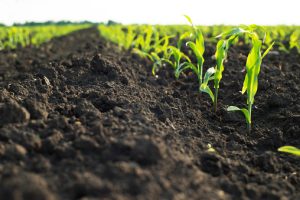05 Dec Soil Management and Food Security
Soil Management and Food Security
The topic is based on Soil Management and Food Security. This article talks about how soil management impacts on Environment and Climate Change in India
Relevance for Prelims: Organic Farming, Soil Erosion, Integrated Farming, Food Security
Relevance for Mains: Regenerative Agriculture
Context: The theme of World Soil Day aligns with the guiding theme “Soil, where food begins” to increase awareness of the importance of maintaining healthy soils.
Significance of Soil Management
Carbon Storage: They help in regulating the planet’s climate by storing carbon and are the second largest carbon sink after oceans.
The basis for Food Security: Without proper management of soil, food cannot be grown in an efficient manner. (95% of food comes from the soil).
Habitat: Soils are habitats for beneficial soil microbes; these organisms are nature’s hidden helpers. They form synergistic relationships with plants to protect them from stress and provide them with nutrients, among other tasks. According to the USDA, “one teaspoon of healthy soil contains, 100 million-to-1 billion individual bacteria alone.”
Nature’s Filter: Soils filter surface water of dust, chemicals, and other contaminants. This is why underground water is some of the cleanest sources of water. In fact, according to Soils.Org, “through natural processes, such as soil absorption, chemical filtration, and nutrient cycle, the Catskill Watershed provides New York City with clean water at a cost of $1-to-1.5 billion, much less than the $6-to-8 billion one-time cost of constructing a water filtration plant.”
Concerns Associated:
- Nearly 3.7 million hectares of land suffer from a nutrient loss in soil (depletion in soil organic matter or SOM).
- Excessive use of fertilizers and pesticides and irrigation with contaminated wastewater are also polluting soils. The Impacts of soil degradation are far-reaching and can have irreparable consequences on human and ecosystem health.
- The increase of pressure on land due to the population explosion has increased deforestation which further increases carbon stock and loss of the top layer of soil.

Pic: Close up low angle view of the row of young corn stalks in the field in springtime
Government’s initiatives:
Five-Pronged Strategy: The Government of India is implementing a five-pronged strategy for soil conservation. This includes making soil chemical-free, saving soil biodiversity, enhancing SOM, maintaining soil moisture, mitigating soil degradation, and preventing soil erosion.
Soil Health Card: The government of India launched the Soil Health Card (SHC) scheme in 2015. The SHC is used to assess the status of soil health, and when used over time, to determine changes in soil health. The SHC displays soil health indicators and associated descriptive terms, which guide farmers to make necessary soil amendments
National Mission for Sustainable Agriculture (NMSA) has schemes promoting traditional indigenous practices such as organic farming and natural farming, thereby reducing dependency on chemicals and other Agri inputs, and decreasing the monetary burden on smallholder farmers.
Way Forward:
There is a need to strengthen communication channels between academia, policymakers, and society for the identification, management, and restoration of degraded soils, as well as in the adoption of anticipatory measures. These will facilitate the dissemination of timely and evidence-based information to all relevant stakeholders.
Greater cooperation and partnerships are central to ensuring the availability of knowledge, sharing of successful practices, and universal access to clean and sustainable technologies, leaving no one behind. As consumers and citizens, we can contribute by planting trees to protect topsoil, developing and maintaining home/kitchen gardens, and consuming foods that are mainly locally sourced and seasonal.
Source:
Daily Current Affairs for UPSC
Today current affairs are very important for IAS. Reading daily current affairs helps to enhance general knowledge. If you start to prepare for the IAS examination, you should scrutinize IAS current affairs. Without memorizing important current affairs, You will not pass the Prelims, Mains, and interview exams.
Plutus IAS serves the top 10 current affairs. You get many sites that are providing Daily current affairs for UPSC. But we provide the precise and the best current affairs for UPSC and IAS examinations free of cost. Besides, We use to collect all the important current affairs for IAS exams from the newspaper for example the Hindu, The India Express, The Times of India, Hindustan Times, and other popular newspapers. So get the best daily current affairs for UPSC from us and enhance your general knowledge.
Follow our Current Affairs Classes:




No Comments